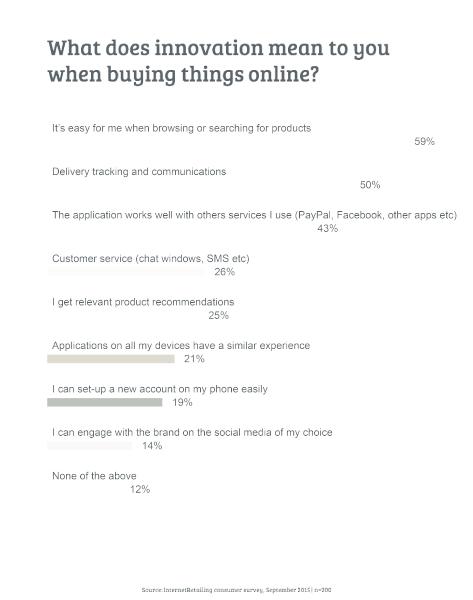Whilst retailers place huge value on digital innovation what about customers? We surveyed 200 consumers to find out:
Our retailer survey showed that 60% of retailers are innovating due to consumer demand but we wanted to know how important consumers themselves felt innovation was. Our UK wide survey, which surveyed more than 200 consumers aged from 18 to 65 years plus found that more than half (53%) of consumers said that they would be put off by shopping with a retailer that appeared to be slow to innovate.
However we also asked what innovation meant to such consumers to understand where they felt innovation should focus. Here ease of payment, navigation and delivery were key priorities for customers with two thirds (66%) of consumers saying that innovation when shopping online for them meant that payment was quick and easy. The second biggest priority for consumers was ease of browsing and searching for products for 59% of respondents, following by delivery tracking and communications for half of consumers. The fourth priority concerned how well retailers’ apps worked with other services used by consumers such as PayPal and Facebook, for 43% of respondents. All these are key areas that retailers are focusing on, showing that mostly retailers’ efforts are aligning with customer needs.
Retailers are focusing hard on digital innovation to improve the customer experience and with good reason – especially for online only retailers. The survey showed that although just over half (55%) of respondents were equally as loyal to online brands as they were to the high street if they had a bad experience whilst nearly 40% were either less loyal or not at all loyal when buying online if they had a bad experience.
With mobile already identified as one of the top focuses of investment innovation for retailers earlier in this report we were also keen to identify consumers favourite retail mobile applications. The results – perhaps surprisingly – showed that perceived brand loyalty to apps may not be happening. 42% of consumers said that they did not use retail mobile apps and nearly a third (29%) said that they did not have a favourite app. The most popular for those respondents who did name their favourite app was Amazon at 12% and eBay at 6%.
Consumers have little tolerance when it comes to how well apps and online sites work however – preferring ease and speed of use to an overload of functionality. Nearly half (47%) of consumers said they didn’t care about clever features and if there was a bug, or the experience was slow, then they would go elsewhere. Less than a quarter (24%) said that they would put up with the odd bug or a slower experience as a payoff for lots of clever features.
Speed and ease of use is set to be as important in the future too with more than half (53%) of those surveyed saying that they would shop wherever it was quickest and easiest. Just over a third (34%) said that continuous innovation and improvement was key to their future loyalty to UK brands when shopping online whilst just over a quarter (26%) said they would always be loyal no matter how good the digital experience of the UK’s global rivals was.
Loyalty is set to dwindle however. 61% of those surveyed said that the next generation wouldn’t care about loyalty to UK brands when shopping online and would shop wherever it was quickest and easiest. 29% said they thought future generations would be loyal as long as they could see continuous improvement and innovation and only 10% said future shoppers would be loyal to UK brands regardless of how innovative global brands were.
Retailers’ views on the importance of digital innovation to the consumer
Whilst innovation is important to the retail experience and to maintaining and growing customer loyalty retailers differ somewhat in how much value they believe their customers place on digital innovation per se, with many retailers saying that their customers are simply concerned with having a good experience rather than worrying about whether retailers are investing in the latest, greatest tech.
However our retail survey showed that many customers are demanding it – in some form or another-with customer demand cited as the second most popular factor that was driving retail businesses’ plans for digital innovation with 60% of respondents choosing it as an influencing factor.
A number of those we interviewed said that their customers weren’t directly concerned with whether a company was visibly innovative or not. “Customers don’t care about digital innovation. They care about problems being solved as quickly and seamlessly as possible,” says Jodie Fox, co-founder and chief creative officer of Shoesofprey.com.
Annabel Kilner, UK country manager for Made.com, says digital innovation should be subtle – so that the customer experiences it but may not actually know it. “I don’t think customers think – ooh this company is innovative. They may think ‘I Iove that feature’ but they don’t think ‘I love that and I’m brand loyal to that retailer because they do all these amazing innovations’. It should be subliminal,” she says.
At New Look digital director Jack Smith says retailers have failed if it isn’t subliminal. “My view is that people in the retail world come to buy product and the minute they become conscious of the digital or store experience then you are starting to fail. They need to be completely immersed in the shopping experience and the only caveat is when it’s so enhancing an innovation that people start to advocate you as a brand,” he says.
At ShopDirect head of user experience Sam Barton says the company has done a lot of work recently in defining its customer – the aptly named Ms Very. “That allows us to focus on where to invest and allows us to understand that she isn’t the biggest investor in the latest technology. She’s a follower. That definition helps stop us going out and creating new experiences that are a little bit too advanced for her needs,” he says.
At Walls and Floors web development manager Tom Murrell says consumers do like to see digital innovation in an online only business since that is their only storefront so impressions have to be top-notch. “Being online with no face to face interaction like a high street shop offline customers need to get a good feel and feeling of an online brand and online shop. Digital innovation inspires confidence, positivity and trust online – after all if you land on an ecommerce website that looks like it hasn’t been updated since 1998 does that leave you with a positive experience that you can trust the company, that they understand your needs and can deliver? Personally I think that shows a lack of digital innovation and leadership,” he says.
Ben Robert Richardson, cofounder and marketing director of FreestyleXtreme, says digital innovation is fundamental to any business since it shows businesses to be constantly trying to better themselves. “Innovation keeps your customers loyalty and gives you a message to communicate to your customers – you can say “We’ve improved this for you,” he says.
And it can also be important simply for getting noticed amongst the competition Richardson says. “It’s also how they find you in a crowded market so it’s not always a case of influencing how and what they buy – it’s actually getting yourself on their radar to start with,” he says.







